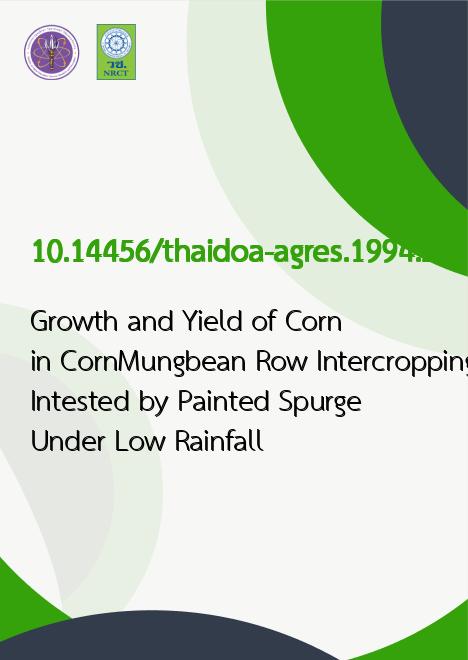
|
Growth and Yield of Corn in Corn/Mungbean Row Intercropping Intested by Painted Spurge Under Low Rainfall |
|---|---|
| รหัสดีโอไอ | |
| Creator | Sanayh Kroakaw |
| Title | Growth and Yield of Corn in Corn/Mungbean Row Intercropping Intested by Painted Spurge Under Low Rainfall |
| Contributor | Amnart Chinchet, Chaleow Dithasanthia, Sompong Dithasanthia, Athinya Pamornjun |
| Publisher | Department of Agriculture |
| Publication Year | 2537 |
| Journal Title | Thai Agricultural Research Journal |
| Journal Vol. | 12 |
| Journal No. | 3 |
| Page no. | 203-212 |
| Keyword | corn/mungbean row intercropping, drought, ecological weed control |
| URL Website | https://at.doa.go.th/journal |
| Website title | Thai Agricultural Research Journal |
| ISSN | 0125-8389 |
| Abstract | Field growth and yield of corn (Zea mays L.) grown as sole crop and row intercropping with broadcasted mungbean (Vigna radiata L. Wilczedk) at 20, 40 and 80 plants/m2 and/or infested by painted spurge (Euphorbia geniculata) were evaluated under rainfed or rainfed with supplemental rainfall in the rainy season of 1993. The latter was fulfilled by two overhead sprinkler irrigations during drought from 2 to 5 weeks after corn emergence. A 3-week drought resulted in decreasing corn height with no negative effect on its grain yield. This was due partly to the ability of corn to recover from drought betwen 10-14 days after resumption of ample raining. Mungbean grain yield, however, was reduced by 30% as a result of drought for the same period. The yield of corn was not affected by intercropped mungbean, but decreased by 21% due to an infestation of E. geniculata of 157 plant/m2 at the critical period of weed competition for corn. Even though intercropped mungbean at 80 plant/m could decrease population of E. geniculata in a corn's plot by 30%, the yield of infested corn was still further decreased by 16%. Interaction between water regime and cropping pattern was not significant. |